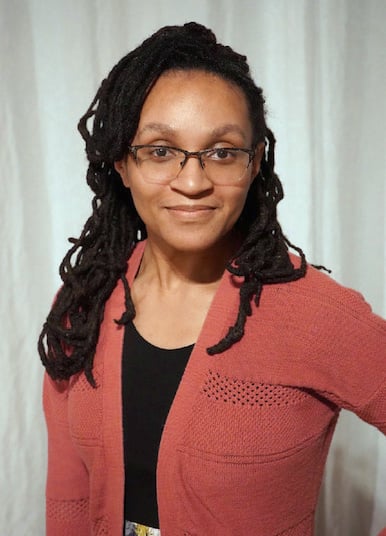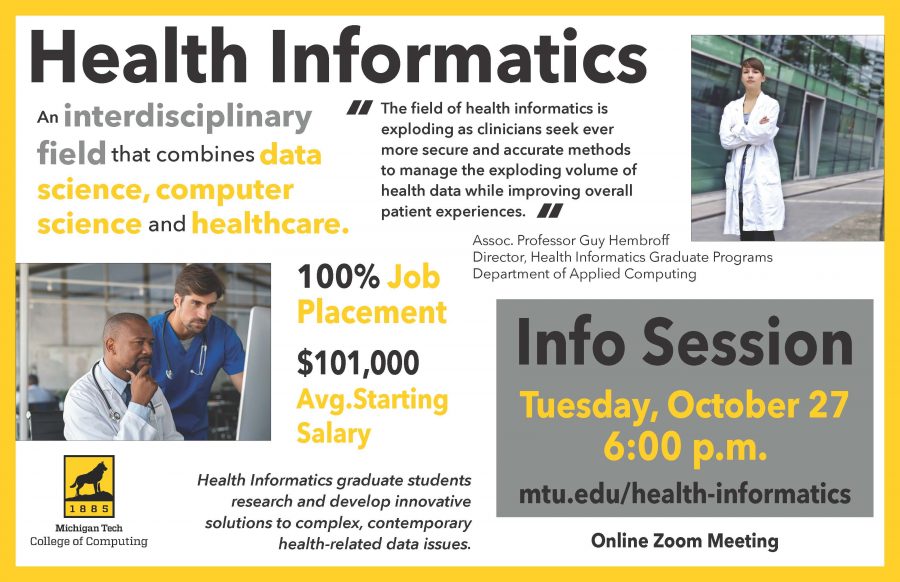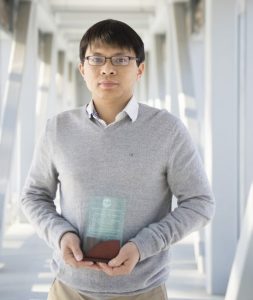by Graduate Student Government
This year’s Graduate Research Colloquium organized by the Graduate Student Government was hosted virtually due to COVID restrictions. There were in total 48 presentations — 17 poster presenters and 31 oral presenters.
Poster presentations took place in a pre-recorded video style and the oral sessions were hosted live via Zoom. You can watch all the poster videos and recordings for the oral sessions here. Each presentation was scored by two judges from the same field of research.
Participants were able to gain valuable feedback from these judges before presenting their research at an actual conference. It was stiff competition amongst all presenters. Following are the winners for each of these sessions.
Of the many presentations were the following by two graduate students affiliated with the College of Computing.
Simulating the Spread of Infectious Diseases
Meara Pellar-Kosbar, Data Science
This simulation is designed to show how a fictional viral illness could spread among people in a virtual room. Over the course of the virtual simulation, a number of automatic simulated people called subjects will move about an adjustable virtual grid. During this time, subjects will come into contact with each other and with item cells in the virtual room. Subjects will be exposed to this fictional virus via contact with other subjects, items, and via the air when within a certain distance of a contagious subject. The viral counts of each subject will be tracked and shown as the simulation runs, showing how the actions of the subjects’ affects their viral counts.
Cultural Competence Effects of Repeated Implicit Bias Training
Karen Colbert, Social Sciences
Karen Colbert is a PhD student in the Computational Sciences and Engineering department.
Abstract: Diversity training literature suggests that mandatory and recurrent sessions should maximize training efficacy, but research has primarily focused on single, brief training sessions that are often voluntary. Michigan Tech is one of few universities to implement required and repeated diversity training for all faculty who serve on search, tenure, and promotion committees. The goal of this study is to evaluate the training’s effectiveness, as well as to fill the gap in research on mandatory recurring diversity training. To do this, we anonymously surveyed faculty members on their knowledge, attitudes, and skills related to content from the Diversity Literacy program and scored responses to create a single composite score for each participant. We hypothesized that composite Cultural Competency Score (CCS) would be higher for faculty who 1) have taken more refresher trainings, and 2) completed training more recently. This study included 130 total respondents (large sample), 69 of whom provided their Diversity Literacy completion information anonymously through Human Resources (small sample). Composite CCS did not differ significantly by frequency of training, H(2)=3.78, p=.151. CCS did differ significantly by years since last training, F(2,63)=4.436, p=.016. Results from both large and small groups showed no statistical significant relationship between CCS and faculty committee service. CCS was negatively correlated with years employed at Tech in both the large (r=-0.363, p=0.002) and small (r = -0.258, p=0.01) samples. This relationship between low CCS and longer employment at Tech may additionally be related to the Diversity Literacy program’s implementation in 2010. Qualitative responses were also collected regarding training material that faculty found most memorable (N=102) and most confident to put into practice (N=93).

Ms. Karen Colbert , a PhD student in Computational Sciences and Engineering and a graduate research assistant for ADVANCE at Michigan Tech, has been selected as a Diversity Scholar for the 2021 RStudio Virtual Conference.
Ms. Colbert is one of 70 Diversity Scholars selected from around the globe, all of them focused on building skills for teaching and sharing. Ms. Colbert notes that her role as a Diversity Scholar will focus on ways she can use RStudio to help “bridge equity for Native faculty and faculty who serve Tribal communities.”
A plethora of teaching and user workshops and resources are available through the RStudio network. Following completion of the Virtual Conference, Ms. Colbert will participate in two online workshops and become part of an enhanced network of scholars and resources, available both before and after the conference.
Ms. Colbert says that a large barrier facing tribal colleges is accessibility and sustainability with regard to costly technology, such as licenses, equipment, and support. Since RStudio is open source and has vast capabilities to perform tasks ranging from web design to reporting to statistical analyses and assessments, Ms. Colbert hopes that learning how to “teach” R will enable her to host workshops for faculty. She says it may also help her design an interactive course to help those who may be intimidated by programming, and ultimately create a platform to introduce tribal colleges to the data visualization, supercomputing, and cloud computing communities.
In addition to the equity gaps facing Native faculty, Ms. Colbert also acknowledged that there are many equity gaps for faculty at all ranks and across institutions, including MIchigan Tech.
This is where Ms. Colbert’s connection to ADVANCE at Michigan Tech–and its mission to enhance equity in STEM faculty–comes into play. She hopes that her research, her experiences as a Diversity Scholar, and her position as a graduate research assistant with ADVANCE, will allow her to pursue opportunities to bring resources to all faculty members.
Further, she will endeavor to assist faculty in demonstrating “their best work to the world in the most professional way, whether it’s for teaching undergraduates or within our own research.”
Ms. Colbert believes this goal starts with making tools and resources accessible to everyone. Her ultimate aim is to develop unique R packages as a part of the solution.
Ms. Colbert holds a bachelor of science in electrical engineering and a master of science in data science, both from Michigan Tech. She also serves as lead math faculty at Keweenaw Bay Ojibwa Community College, Baraga. Mich., in addition to pursuing her PhD and conducting research.
ADVANCE is an NSF-funded initiative dedicated to improving faculty career success, retention, diversity, equity, and inclusion. To learn more about our mission, programming efforts, and to check out our growing collection of resources, contact us at advance-mtu@mtu.edu and visit our website at mtu.edu/advance.

We are looking forward to celebrating the accomplishments of our graduates at a Class of 2020 virtual Convocation program on Friday, December 18, 2020, at 3:30 p.m. EST.
The celebration will include special well-wishes from CC faculty and staff, and many will be sporting their graduation regalia. It is our privilege to welcome Ms. Dianne Marsh, 86, ’92, as our Convocation speaker. Dianne is Director of Device and Content Security for Netflix, and a member of the new College of Computing External Advisory Board.
We may be spread across the country and world this December, but we can still celebrate with some style. We look forward to sharing our best wishes with the Class of 2020 and wishing them continued success as they embark on the next phase of their lives!
This December, 40 students are expected to graduate with College of Computing degrees, joining 92 additional Class of 2020 PhD, MS, and BS alumni.

Dianne Marsh ’86, ’92 is Director of Device and Content Security for Netflix. Her team is responsible for securing the Netflix streaming client ecosystem and advancing the platform security of Netflix-enabled devices. Dianne has a BS (’86) and MS (’92) in Computer Science from Michigan Tech.
Visit the Class of 2020 Webpage
Congratulations Graduates. We’re proud of you.
Are you thinking about attending graduate school? Are you open to learning about emerging career areas in which you can leverage your undergraduate learning in healthcare or computer science?

On Tuesday, October 27, 2020, at 6:00 p.m., via online Zoom meeting, the Health Informatics Master of Science and Accelerated Master’s programs will present a virtual info session for current students.
Please pre-register for the free info session here.
From the general to the specific, the info session will cover what you need to know about applying for and completing a Health Informatics master’s degree at Michigan Tech.
Attendees will consider the benefits of an advanced degree, learn about the fast-track accelerated master’s program, review the the online application process, and more.
Associate Professor Guy Hembroff, Health Informatics graduate program director, and Jacque Smith, director of Enrollment Services for the Michigan Tech Graduate School, will host the info session.
A link to the virtual info session will be shared shortly.


Associate Professor Guy Hembroff, director of Michigan Tech’s Health Informatics graduate program, presented an invited virtual talk to physicians, residents, and medical students at the Bahiana Medical School, Salvador, Brazil, on September 25, 2020.
Hembroff spoke about, “The Challenges and Opportunities of Artificial Intelligence in Disease Prevention and Monitoring.”
BAHIANA (Bahia School of Medicine and Public Health) is a private, nonprofit, educational, cultural, scientific and healthcare institution. Its main purpose is “teaching, research and the spread of knowledge and special services in the fields of health, science and culture in general.” Learn more here.

A paper authored by Michigan Tech Assistant Professor Bo Chen, Computer Science, and Data Science master’s student Shashank Reddy Danda, has been accepted for publication in the IEEE Internet of Things Magazine special issue on Smart IoT Solutions for Combating COVID-19 Pandemic. The special issue will be published in September 2020.
The paper focuses on Chen’s research of COVID-19 prevention through the leveraging of computing technology. The project is currently supported by a Michigan Tech College of Computing seed grant, and external funding for further development is being pursued.
Chen is a member of the ICC’s Center for Cybersecurity.
Download a preprint of the paper here.
Abstract:
Recently, the impact of coronavirus has been witnessed by almost every country around the world. To mitigate spreading of coronavirus, a fundamental strategy would be reducing the chance of healthy people from being exposed to it. Having observed the fact that most viruses come from coughing/sneezing/runny nose of infected people, in this work we propose to detect such symptom events via mobile devices (e.g., smartphones, smart watches, and other IoT devices) possessed by most people in modern world and, to instantly broadcast locations where the symptoms have been observed to other people. This would be able to significantly reduce risk that healthy people get exposed to the viruses. The mobile devices today are usually equipped with various sensors including microphone, accelerometer, and GPS, as well as network connection (4G, LTE, Wi-Fi), which makes our proposal feasible. Further experimental evaluation shows that coronavirus-like symptoms (coughing/sneezing/runny nose) can be detected with an accuracy around 90%; in addition, the dry cough (more likely happening to COVID-19 patients) and wet cough can also be differentiated with a high accuracy.
Bo Chen is an assistant professor in the Department of Computer Science. His areas of expertise include mobile device security, cloud computing security, named data networking security, big data security, and blockchain.
Shashank Reddy Danda is an MS student in Data Science. He is currently working as a research assistant in MTU Security and Privacy (SnP) Lab under the supervision of Dr. Bo Chen.
IEEE Internet of Things Magazine (IEEE IoTM) is a publication of the IEEE Internet of Things Initiative, a Multi-Society Technical Group.